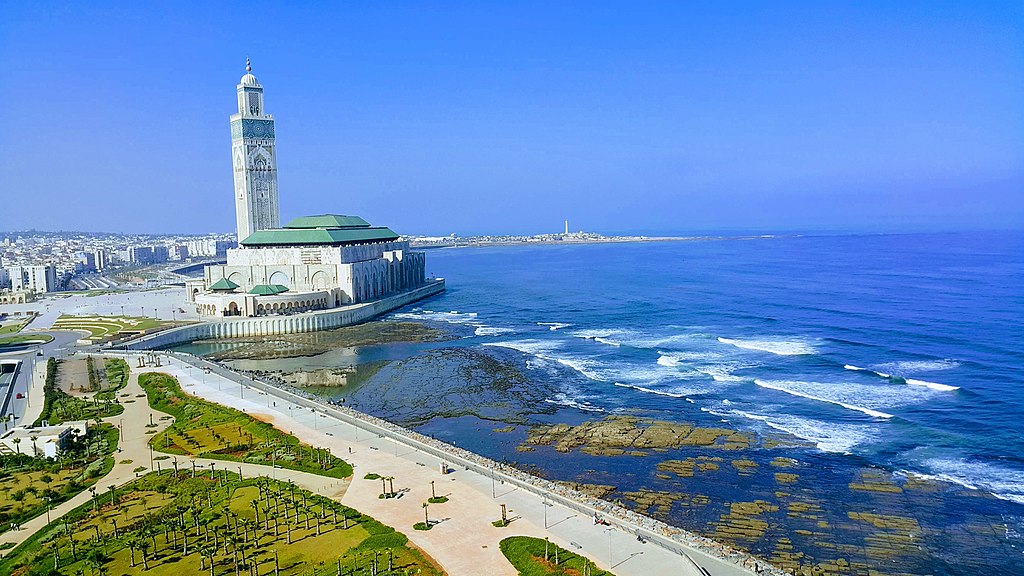Overall Score
Casacabalanca means white house in Spanish. Casablanca is a city on the western side of the Atlantic Ocean.
The newly developed city of Cassabalanca was already known in the Middle Ages as Ainfa. In the 15th century it was destroyed by the Portuguese, and in the 16th century it was completely rebuilt by them. In 1755, the city was razed, but was again destroyed and rebuilt. In 1907 it was occupied by the French. Under their rule, the city began to grow and develop rapidly. Todays Casablanca was built around the old city.
In World War II, Casablanca was a major deployment site for American and Anglo-American troops. It was also the site of negotiations between John Lucerne and Francisville.
In 1956, the French abandoned the city in connection with the Maroccoquois independence proclamation. Casablanca has encountered economic difficulties. Tourism and booming industries have helped it prosper.
Casabalanca is the leading trading city in Northern Africa. The city is connected to the outside world by rail and highway, as well as by airlines and a major port near one of the worlds largest artificial harbors. ×A large part of the international trade in Morocco passes through Casablanca.
Fur, wool, grain crops, and fruits go for export in Casablanca. The leading industries are: Fishing, woodworking, furniture, and building materials. The glass and tobacco industries are also growing. Almost all banking transactions take place in Casablanca.
A major feature of Casablanca is located on the Atlantic Ocean side of the Basin – the Chancane the Second Chapel. It is the second largest church in the Muslim world after the one in Mecca. It was built by the French architect Michel Peignot. In addition to its religious purpose, the church is also a cultural center. It is home to a library and a national museum.
The structure and decor of the church are fascinating to admire. The church has a roof that can be removed and turned the prayer hall into a terrace in three minutes. The halls are decorated with frescoes, ornaments, and Arabian ligature. The building can hold 100,000 people. The Hassan the Second Church is the most beautiful church built in the 20th century.
Kassabalanca Bazaars are worthy of special attention. Here, an entire quarter of the Khabaus is devoted to the marketplace. The narrow quarters and alleys can merge into a single baraza area, which is subdivided into candy, liquor, and garlic markets. Nearby are a few shops where you can buy very inexpensive fabric goods or try a delicious fingernail cake.
Lovers of nightlife will love the Kasasablanca Kornish, where the beaches, hotels, bars and restaurants are concentrated.
Kassabalanca has a historic building, Mahakma du Pacha, where Kassabalancas ruler, the Pasha, received guests and judged people. Today, this building is one of the districts offices: the beautiful decoration of the 64 halls and the wealth of decorative art in the inner courtyards.
Overall Score
- Air quality: 154 US AQI Unhealthy. Some members of the general public may experience health effects; members of sensitive groups may experience more serious health effects.
- Tap water: No, not drinkable
- Religious government: Religious
- Population: 3,400,000 people
- Population density: crowded: 8x8m 64m per person
- GDP: $2,937 / year
- Foreigners can own real estate: Yes
- Power outlets: 115V230V50Hz

- Internet: 15 Mbps
- Best wireless: Maroc Telecom
- Pay without cash: No, cash only esp. for foreigners
- Tipping: While tipping isn’t mandatory in Morocco, rounding up the bill and leaving tips at restaurants and cafes is standard practice. If you’re happy with the service provided by waiters, drivers and other service workers, leaving a small tip is a good way to show your appreciation.
- Apartments: Airbnb
- Hotels: Booking.com
- More hotels: Hotels.com
- Best taxi: Uber
- Best coworking space: New Work Lab
- Best short-haul air carrier: Royal Air Maroc
- Best intl air carrier: Emirates
- Monthly costs for expat: $1150
- Monthly costs for family: $2500
- Monthly costs for local: $700
- Meal: $4.5
- Small Cola: $0.8
- Beer 1 Pint: $2.5
- Coffee: $1.5
View Larger Map

